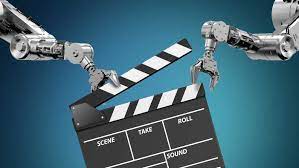How Artificial Intelligence is Revolutionizing the Film Industry - AI's Impact on the Film Industry

Artificial Intelligence (AI) has swiftly permeated various industries, transforming the way we work, live, and entertain ourselves. One sector where AI has made significant strides is the film industry. In this article, we will delve into the profound impact of AI on the world of cinema, exploring how it is revolutionizing filmmaking, from pre-production to post-production and even distribution. Get ready to embark on a journey through the fascinating world where technology meets creativity!
Table of Contents
- Introduction: The AI Revolution
- AI in Scriptwriting
- Casting and Character Creation with AI
- AI-Enhanced Pre-Visualization
- AI in Production: Efficiency and Cost-Effectiveness
- Post-Production Magic with AI
- AI-Driven Marketing and Promotion
- Distribution and Audience Insights
- AI's Impact on Film Critique and Analysis
- Challenges and Ethical Concerns
- Future Prospects: AI and Filmmaking
- Conclusion: A New Era of Cinema
- FAQs: Your AI Film Industry Queries Answered
Introduction: The AI Revolution
The film industry has always been at the forefront of technological innovation. From the transition to color and sound to the advent of computer-generated imagery (CGI), it has embraced change to deliver captivating experiences. Now, AI is the newest star in the cinematic universe. It's not just a tool; it's a creative partner that offers solutions and sparks inspiration at every stage of filmmaking.
AI in Scriptwriting
The journey of a film starts with a script, and AI has a significant role to play here. AI algorithms can analyze vast amounts of data, identifying trends in successful scripts, and even generating dialogues that resonate with audiences. This not only speeds up the scriptwriting process but also helps in crafting engaging narratives.
Casting and Character Creation with AI
Selecting the right actors is crucial to a film's success. AI can assist in casting decisions by analyzing actors' previous performances and predicting their compatibility with a given role. Moreover, AI can create entirely digital characters that look and act like real humans, expanding the possibilities of storytelling.
AI-Enhanced Pre-Visualization
Before the cameras start rolling, AI can assist in pre-visualization. It can generate 3D models of scenes, helping directors plan shots and sequences more effectively. This reduces shooting time and costs while ensuring the creative vision is realized.
AI in Production: Efficiency and Cost-Effectiveness
AI streamlines production by optimizing resource allocation, scheduling, and logistics. It can predict equipment maintenance needs, reducing downtime. Additionally, AI-powered drones and cameras enable filmmakers to capture breathtaking aerial shots with precision.
Post-Production Magic with AI
The editing room is where AI truly shines. It can analyze hours of footage to select the best takes, seamlessly remove bloopers, and even generate visual effects. AI algorithms can enhance color grading, sound design, and special effects, elevating the overall quality of the film.
AI-Driven Marketing and Promotion
AI helps studios identify target audiences and tailor marketing campaigns accordingly. It can predict a film's box office performance, guiding promotional efforts. Chatbots and virtual influencers powered by AI engage with fans on social media, creating buzz and anticipation.
Distribution and Audience Insights
AI algorithms analyze viewer preferences and viewing habits, allowing streaming platforms to recommend films tailored to individual tastes. Additionally, AI-driven analytics provide valuable insights into audience reactions, helping studios make data-informed decisions.
AI's Impact on Film Critique and Analysis
Film critique is no longer exclusive to humans. AI systems can analyze films, identifying thematic elements, character arcs, and emotional resonance. They can even predict a film's potential for awards based on historical data.
Challenges and Ethical Concerns
While AI offers tremendous benefits, ethical concerns exist. Questions about job displacement, copyright issues, and AI-generated content authenticity are hot topics in the industry. Striking the right balance between human creativity and AI assistance is crucial.
Future Prospects: AI and Filmmaking
The future of AI in the film industry is promising. As AI continues to evolve, it will likely play an even more significant role in content creation, marketing, and distribution. The synergy between human creativity and AI innovation will shape the films of tomorrow.
Conclusion: A New Era of Cinema
In conclusion, Artificial Intelligence is not just transforming the film industry; it's revolutionizing it. From scriptwriting to post-production, marketing, and beyond, AI's influence is profound. While challenges and ethical concerns persist, there's no denying that AI has opened up exciting new possibilities for filmmakers and audiences alike.
FAQs: Your AI Film Industry Queries Answered
1. How does AI impact film scriptwriting?
- AI assists in scriptwriting by analyzing data to generate engaging dialogues and storylines quickly.
2. Can AI create entirely digital actors?
- Yes, AI can create digital characters that look and act like real humans, expanding creative possibilities.
3. How does AI enhance post-production?
- AI can analyze footage, select the best takes, remove bloopers, and enhance visual and sound effects.
4. What are the ethical concerns surrounding AI in the film industry?
- Ethical concerns include job displacement, copyright issues, and the authenticity of AI-generated content.
5. What does the future hold for AI in filmmaking?
- AI's role in filmmaking is set to grow, with increasing innovation in content creation, marketing, and distribution.
Now that you've glimpsed the AI-driven revolution in the film industry, it's time to embrace the future of cinema.


